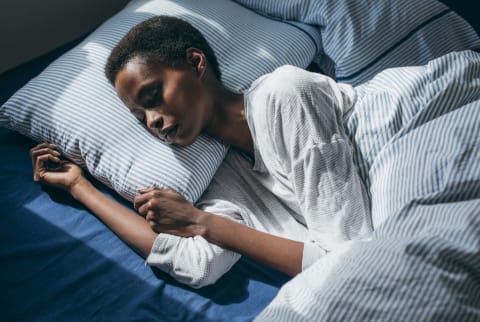Advertisement
Is Your Sleep Position Disrupting Your Sleep Quality?
Ko Im, RYT-200, is a Columbia School of Journalism graduate who received her lovingkindness certificate through the Nalanda Institute for Contemplative Science. She has been recognized by the Juno Women’s Leadership at the Omega Institute for Holistic Studies.

Years ago, a survey of 1,000 people revealed six different sleep positions, and a researcher associated them with personality traits. For example, someone who sleeps on her back with arms straight at her sides—aka a "soldier"—might be more reserved; side sleepers, or "logs," are likely social butterflies; and a mattress-hogging "starfish" who sleeps with spread-out limbs might be a good listener.
Of course, how you sleep is usually just "however you feel most comfortable," explains neurologist and sleep medicine specialist Derek Chong, M.D. And though "one factor might be personality," the real question is what your sleep position M.O. means for your sleep quality.
That's important because "sleep is how we consolidate information from the day and integrate it in our long-term memory," says sleep expert Daniel Gartenberg, Ph.D., who's studied the brain benefits of sleep. So "starfish" nuances aside, there are three general sleeping positions, according to Gartenberg:
- Supine. Sleeping on your back may be helpful for anyone with back pain, though it's not ideal for people with sleep apnea because of a greater likelihood of obstruction, says Gartenberg.
- Side (left or right). If you have apnea or snore, Gartenberg says it's best to sleep on your side, which causes the tongue to fall to the side as well. Michel Carmer Bornemann, M.D., a sleep specialist and sleep disorders researcher, also adds that the fetal position is one of the most popular and most comfortable for women who are pregnant as it may improve circulation in the body.
- Prone. Lying on your stomach could be a good position for those with apnea and snorers—but Gartenberg also notes that it could place a strain on your back.
Of course, the quality of sleep you get every night isn't just dependent on your position. And while our circadian rhythm naturally nudges us when it's time to wind down and time to wake up, there are a few ways we can be proactive about supporting a healthy night's rest.

How to support your body and mind while falling asleep.
Consider this: It should typically take between 10 to 20 minutes to fall asleep once you get into bed. Taking more or less time may be your body's way of telling you that something's off. The good news is that you can help regulate your circadian rhythm and support restful sleep by supplementing with melatonin—the hormone your body releases to welcome sleep at night and then lowers to wake you up in the morning. Nature Made's Melatonin Gummies are a great-tasting way to support a regular sleep/wake cycle, providing 2.5 mg melatonin per gummy. Beyond that, our experts revealed some of the top factors affecting your zzz's:
- Exercise. While working out before bed can certainly make you feel exhausted, think twice about squeezing in a sweat session right before bed: The adrenaline in your system may disrupt your sleep quality, says Chong.
- Body temperature. Another reason to skip the pre-bedtime HIIT class: Your body relaxes when it's comfortable and cool. A cooler body temperature, says Chong, serves as a cue to your brain that it's time to sleep. A few minutes of deep breathing can help lower heart rate, cooling down the body.
- An active mind. Ask anyone with a big morning meeting or a much-needed vacation on the calendar: Whether it's stress, excitement, or just racing thoughts, an active mind can easily keep you lying awake in bed. A meditation or breathing exercise can be helpful here, too.
- Light. Tech keeps us mentally engaged, and the blue light from our devices can reduce melatonin levels, making it harder to fall asleep and affecting the quality of sleep. Beyond that, Bornemann advises avoiding bright light at night and getting exposure to sunlight during the morning to help regulate your natural circadian rhythm.
- Boundaries. Keeping your bedroom space for the purpose of sleep can impact your rest, too. As Bornemann puts it, you can "strengthen the association between bed and sleep. If you associate a particular activity with anxiety, omit it from your bedtime routine.”
- Awareness. Ultimately, you support your unique circadian rhythm by getting to know it. Gartenberg suggests, "entrenching your rhythm with the timing of light, meals, energy expenditure, and even your socializing. Know when you are tired and only try to fall asleep when you are tired. Sleep is not about trying to fall asleep but being able to let go." Protect your sleep by adopting a better lifestyle, so you can soldier on and sleep like a log.
